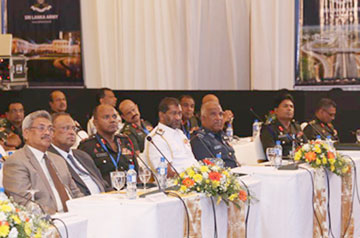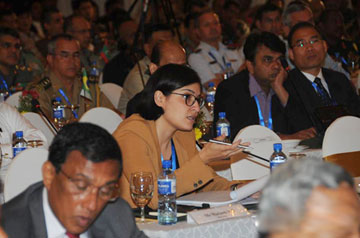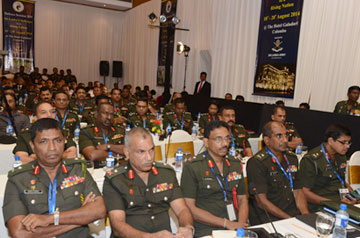|
Defence Seminar 2014:
'Strengthening the nexus between peace and development'
By Dhaneshi Yatawara
 |
|
Defence Ministry Secretary
Gotabaya Rajapaksa, Secretary to the Ministry of Law and Order
Maj. Gen. (Rtd) Nanda Mallawarachchi and the Commanders of the
Tri Forces at the inaugural session. |
Themed on 'Sri Lanka: Challenges to a rising nation' the meticulously
organised Defence Seminar 2014 was held last week for a full three days.
It was a forum of eminent scholars, intellectuals, policy-makers,
security chiefs, think-tanks of different spheres. The Defence Seminar
took its roots four years ago and is the brainchild of Secretary to the
Ministry of Defence and Urban Development Gotabaya Rajapaksa.
Transforming from a military perspective to a more civil, development
oriented perspective the Defence Seminar today has found its own niche
in the international setting as a marked gathering of intellectuals and
think tanks posing a significant impact on decisions made by
Governments.
A wide gamut of issues related to Sri Lanka’s post-terrorism recovery
and diverse challenges the Nation faces in its march to be the Wonder of
Asia were discussed going beyond the island mentality.
Present phase
Secretary to the Treasury and Ministry of Finance and Planning, Dr
P.B. Jayasundera, delivering the keynote address at the inaugural
session of the Defence Seminar – 2014, said that “the transition from a
middle income economy involves targeting to achieve US $ 7,500 per
capita by 2020, like we have already raised our per capita from US
dollars 1,200 in 2005 to US $ 2,400 in 2009, and from there towards US $
4,000 in 2015 - in an extremely challenging environment.”
 |
| |
 |
| A cross
section of the delegation during the sessions. |
Dr. Jayasundara focused on how the post independent events pushed
this nation towards becoming a marginalised nation by 2004, followed by
the underlying strategic shift in 2005 through the adoption of Mahinda
Chinthana : the national vision of Sri Lanka, giving an overview of the
current phase of development in a globally challenging environment.
He said that if Sri Lanka is to emerge on its own comparative
advantage and strengths within the framework of an integrated global
economy, the challenge is to restore the security of the five pillars -
namely, food, national, macroeconomic, environment and human resource
security.
“Managing this task is the underlying story of development since
2005,” he said.
“On the economic front, the US and UK financial fallout in 2008-09,
the sharp rise in oil prices, the US fiscal crisis and the Eurozone
economic crisis, and the global economic slowdown placed the already
weaned Sri Lanka on another wave of economic challenges.
While many countries differed responses, Sri Lanka was able to take
bold corrective economic measures such as allowing greater flexibility
in exchange rate regime, adjustment of fuel, electricity and water
tariffs, monetary policy tightening to manage excessive credit expansion
and several reform initiatives such as reorienting the taxation strategy
towards broadening its base and improved debt management strategies,” he
said.
Among top 10
He highlighted that the country is well placed in the World Rule of
Law Index and the Global Peace Index, being on top in South Asia. It is
also placed high in the region as per the Global Infrastructure Index,
Economic Freedom Index, Ease of Doing business index and Global
Competitiveness Index.
“The Human Development Index ranks Sri Lanka among the top 10 in the
Asian region, while presently commanding the second highest number of
Chartered Accountant students in the world, only next to UK.
With the high rate of enrollment for medicine, engineering, commerce,
law, nursing, teaching and technical fields, the country is well
positioned to attract professional services and related industries - and
move from unskilled labour intensive industries to skilled and
technology based industries.
Sri Lanka is among the top 50 leading service locations in the world
in the delivery of IT-BPO and other knowledge services, having advanced
to the 21st place,” Dr. Jayasundara said.
Explaining on the Government’s ambitious development goals Dr.
Jayasundara elaborated on each goal.
“Surpassing US $ 7,500 per capita income in 2020 remains our income
goal.
Maintaining a 97 percent employment level with an increased number in
the skilled categories of the workforce remains our employment
objective.
A zero maternal and child mortality and longer life expectancy of
near 80 years along with 100 percent secondary school enrollment and
higher computer literacy, form our human development foundation targets.
All districts to be made poverty free in terms of the poverty
headcount, while also freeing them from communicable and
non-communicable deceases and malnutrition are the poverty reduction
goals.
Stability
A lower single digit inflation being the price stability goal, will
improve financial management and supply side in the real economy. In
this context, the underlying economic growth rate needs to be
accelerated beyond 8 percent. This scale of economic growth depends on
the level of investments, productivity, improvements in the policy
environment and the institutional setup to do business efficiently,
application of research, technology and innovation, macroeconomic
stability, national security and law and order.”
“Complementing the thrust of the social responsibility of the
Government, public spending on social security needs to be protected
with special emphasis on the elderly and vulnerable groups. Channeling
enhanced public expenditure to rural centric development initiatives and
agriculture, fisheries and livestock is the core of the all-inclusive
development strategy of ‘ Mahinda Chintana : Vision for a new Sri Lanka’
to further strengthen food security. All these are viable only if the
nation is capable of providing resources for national security, which is
a primary responsibility of the Government. Our challenge in the years
ahead while moving ahead in this journey towards success, is to engineer
the national Budget in line with these considerations,” he added.
New order
“The lead taken by the Asia Pacific region in the global economy,
signals of a new economic order,” he said progressing in his speech.
According to Dr. Jayasundara, managing all these require us to be
vigilant at all times in relation to all aspects of our respective
responsibilities in public life. The country needs to be vigilant of
possible national security risks as well as economic and environment
risks.
“I believe that success comes by following, as I have seen in every
aspect of management of our President, start by doing what is necessary;
then do what is possible; and suddenly you are doting the impossible,”
he said.
Secretary to the President Lalith Weeratunga said, “Reaching seventy
third position in the United Nations Human Development Index (HDI) –
2013 itself, asserts that Sri Lanka has performed well, and this rise
means economic development.
This undoubtedly encourages us to do better, strengthening the nexus
between peace and development which emanates from security and safety.”
Delivering his observations on the theme ‘Peace and Rise of Sri
Lanka: an Inseparable Partnership’, in the Session one Weerathunga
recalled how brief ‘peace processes’ in the past, fortified LTTE
violence and disrupted the possibilities for durable peace.
Quoting a few world class social strategists, Weerathunga reminded
that positive peace is more than the absence of war and people are not
only killed by bullets and mines alone. “They also die of poverty,
starvation, disease and other social factors. So we have to make our
social fabric stronger and thereby restoring trust in our beneficiaries.
Individual efforts should come down to collective efforts under the
policy paradigm, Mahinda Chinthana which has set out clear guidelines in
our march to social and economic prosperity,” Weerathunga pointed out.
Confidence
In response to some queries, raised by a few participants,
Weerathunga said that the Sri Lanka Army has created a model for the
rest of the world to follow.
“It is the very Army that crushed terrorism that has made this change
under the guidance of Gotabaya Rajapaksa, Secretary to Ministry of
Defence and Urban Development.
“We are moving forward with confidence in all sectors and when the
social stability returns most of our problems would settle. When you
look at closely how the numbers of schools alone, have increased in the
aftermath of the war, this is significantly proven what the peacetime
can achieve,” Weerathunga said.
Director at the Indian Institute of Peace and Conflict Studies, Dr D.
Suba Chandran, Member of Parliament and President of the Janatha Party
of India, Dr Subramanian Swamy, Founding Director of the Afghanistan’s
Organisation for Policy Research and Development Studies, Mariam Safi,
President of the Institute of Regional Studies in Islamabad, Ambassador
(Retd) Arif Ayub, Analyst at the International Economic Relations and
Global Issues Program at the Polish Institute of International Affairs,
Patryk Kugiel, President of the African Association of Political Science
in Tanzania, Prof. Rwekaza S Mukandala, Director, Foreign Policy and
Security Studies at the Institute of Strategic and International Studies
of Malaysia, Dr. Tang Siew Mun, Assistant Director of the Chinese
Institute for Foreign Policy Studies, Dr. Wang Weihua and Director of
the European Union Centre in Singapore, Dr. Yeo Lay Hwee,also submitted
presentations.
Development
Chairing the final session of the Defence Seminar, Ambassador
Ravinatha Aryasinha who is also Sri Lanka’s Permanent Representative to
the UN in Geneva said that this forum not only helps remember the
suffering the Sri Lankan people endured with resilience for over 30
years and overcame following the defeat of terrorism on 19 May 2009, but
also provides an opportunity to reflect on facets of development in Sri
Lanka that have been made possible, essentially due to this very defeat
of terrorism.
“….I see three sets of global challenge Sri Lanka would face as a
rising nation. First the actions of some states in the international
system, second those arising from the actions of sections of the Sri
Lankan Tamil Diaspora and third the challenges emanating more
specifically from the hardcore LTTE remnants presently spread across
various parts of the world,” he said.
Critically analysing thoughts about Sri Lanka by several western
countries Ambassador Ariyasinha said that there are many theories as to
why some of these countries might be doing so, but none of them
sufficiently explains the double standards, the disproportionate focus
and in some instances the almost obsessive manner in which some of the
key drivers of action against Sri Lanka operate.
“This has more often been done in tandem with extremist sections of
the Sri Lanka Tamil diaspora, as well as certain NGOs and a few media
personalities with a vested interest.
It has resulted in the highly politicised recent resolutions before
the Human Rights Council, as well as the ongoing OHCHR investigation -
which has from its inceptionexceeded its mandate and is being conducted
in an arbitrary manner,” he added.
Funds
He said that the recently released EU Terrorism Situation and Trend
Report 2014 (TE-SAT 2014) of the EUROPOL observes that “LTTE networks
remain in numerous countries, and continue to attempt to rebuild their
structures and operating abilities, especially via fund-raising and
money laundering”.
It notes that “in Switzerland, for instance, police continued to
investigate the activities of a number of former LTTE members. The
investigation focused primarily on operations aimed at channelling funds
collected on Swiss territory to Sri Lanka”, he said.
“Sri Lanka’s long standing plea is that all countries not provide any
political or symbolic support to the abuse of their liberal systems
using various pretences by those pursuing separatism in Sri Lanka, that
they proscribe all LTTE front organisations and maintain strict vigil
over the activities of their operatives, and continue to bring to
justice those violating the law,” he added.
Whether countries at the political level choose to do so and abide by
the conventions they signed up to defeat terrorism particularly in the
aftermath of 9/11, or else will continue to allow such persons to
exploit liberal systems is a question those countries must answer to.
“Acting on such groups is imperative, because today a threat to
another country, would tomorrow be a threat to oneself,” Ambassador
Ariyasinha said adding that it is important that we learn the lessons
from history and do not let history repeat itself. |

